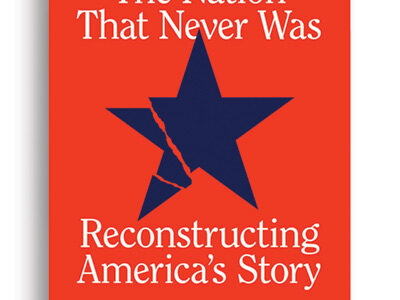
“Tiger Mom” and political theorist Amy Chua on America’s drift toward disunity—and how to stop it.
A month before the manuscript for her new book, Political Tribes: Group Instinct and the Fate of Nations, was due to the publisher, Amy Chua had what she called a “lightbulb moment.”
As she described it in a talk at Perry World House last spring, the Yale law professor and writer on international issues—who is also the author of Battle Hymn of the Tiger Mother, the 2011 memoir-polemic that launched a thousand think pieces (and uncounted household arguments) on parenting styles—experienced this revelation in early 2017. In a class she had been teaching for two decades, she read a passage from her 2003 book, World on Fire: How Exporting Free Market Democracy Breeds Ethnic Hatred and Global Instability : “Under certain conditions, democracy can give rise to demagogues with no political experience, who sweep to power on an anti-establishment platform … by tapping into deep social resentments and racially charged populism.”
“All 80 people [in the class] were looking at me, all thinking the same thing,” she said. Finally one piped up: “‘It sounds exactly like you’re describing the United States.’”
Up until then, she’d been writing Political Tribes with a purely foreign-policy focus, but “I rechanneled the whole thing,” she said. “And one of the main points of the book now is that the United States today is starting to display, for the first time in our history, destructive political dynamics that are much more typical of developing and non-Western countries—that is, ethno-nationalist movements and the transformation of democracy into an engine of zero-sum political tribalism.”
One reason is the fading demographic dominance of whites. (Recent census projections indicate that whites, while still the largest single group by a large margin, will dip below majority status in 2045.) “Every group in America today feels threatened,” Chua said, with polls showing that large percentages of “working class whites” believe they face equal or greater discrimination than minorities. And Christians feel threatened, too, in addition to religious minorities like Muslims and Jews.
Meanwhile, for the first time in US history, a “market-dominant minority” is emerging, she said. Chua coined this term in 1999 “to describe an outside ethnic minority that tends, under market conditions, to dominate economically, often to a startling extent, the poor indigenous majority around them.” According to her analysis, market-dominant minorities have been a factor—along with a more generalized blindness to group and ethnic identities and racism—in American foreign policy failures from Vietnam to Afghanistan and Iraq.
In Vietnam, she explained, the presence of the Hoa, a “1 percent” ethnic Chinese minority—deeply resented in both North and South—that controlled the bulk of Vietnam’s private economy and profited off the US military presence, helped doom efforts to reach hearts and minds. In multi-ethnic Afghanistan, the US failed to recognize that the Taliban was not simply a fundamentalist religious movement but also an ethnic one. “As oppressive as the Taliban is, as much as it is hated, many Pashtuns still today would prefer to have the Taliban in power than their rival ethnic groups” the Tajiks and Uzbeks, who were favored by the US.
“In Iraq, we missed the depth of the division between the Sunni and Shia and the Kurds,” Chua continued. While that is widely acknowledged today, the US also “missed the fact that Iraq, too, had a market-dominant minority.” The Sunnis, with about 15 percent of the population, “dominated the country—economically, politically, and militarily.” This had been the case under Ottoman and British rule and became supercharged during the regime of Saddam Hussein, a Sunni himself, who didn’t just favor them but “brutally persecuted the Kurds and the roughly 60 percent Shia, who represented the vast majority of the country’s rural and urban poor.”
Iraq also exposed the limitations of US policymakers’ romantic notions about democracy and elections as an all-purpose solution, Chua added. When it became clear that the Shia majority “would use their newfound strength for revenge,” Sunni citizens recognized that democracy could endanger them and “joined insurgency groups,” she said. “Instead of bringing peace and prosperity to Iraq, democracy led to civil war and eventually gave rise to ISIS.”
How does this pattern apply to the US itself? Historically, America has been “dominated economically, politically, militarily, culturally by a white hegemonic majority,” Chua said. Though this state of affairs was “invidious,” it was also highly stable politically. What’s changed today is that “class or education has split America’s white majority,” she said. “There is now so little interaction and intermarriage between urban, multicultural coastal whites and whites in the ‘Heartland’—the South, the Trump states—that the difference between them is practically what social scientists would call an ethnic difference.”
The combination of increasing diversity and income inequality are leading to the emergence of “America’s own really weird and idiosyncratic version of a market-dominant minority” in the form of the “much discussed group often referred to as ‘coastal elites.’” The term is something of a misnomer, she added, since members can be found in places like Chicago, for example, and not all are “elite” in the sense of being wealthy. “Nevertheless, with some important caveats, coastal elites bear a disturbing resemblance to the market-dominant minorities of the developing world,” she said. “It is in fact the case that wealth in the United States is extraordinarily concentrated in the hands of a relatively small number of people who primarily live on the West and East coasts.”
Besides dominating key economic sectors (Wall Street, the media, Silicon Valley, Hollywood), this group—in which Chua pointedly included herself—is also “culturally distinct,” she said. “We are a very snobby, tribal, insular group, sharing similar cosmopolitan values, attending the same schools, living in the same cities.” Viewed as favoring minorities and immigrants (legal and illegal) and “caring about the poor in Africa more than the poor in this country,” coastal elites can easily be portrayed as a threat to their less fortunate compatriots.
The result of the 2016 election “is exactly what I would have predicted for a developing country with a deeply resented market-dominant minority,” she said. “That is, we would see the rise of a populist movement in which demagogic voices scapegoated and called on ‘real Americans’ to take back their country. A lot of people saw in Make America Great Again that very coded message: Let’s take back America for who rightfully owns it. Make it the way it was.”
In some 20 years of studying developing countries featuring market-dominant minorities, Chua noted, “I have never found a single example of a country that successfully overcame this in a good way.” While to date the US is exhibiting “just the beginnings of an ethnonationalist movement”—she termed it “ethnonationalist lite”—she did point to a characteristic “elite backlash against the popular side of democracy.”
On the right, this takes the form of voter suppression and gerrymandering. “These are the parts in America where you see people terrified that the country is going to go majority-minority,” she said. “And they don’t want that to happen.” On the left—at least “after about the third glass of wine” at Yale dinner parties—it bubbles up in suggestions about implementing knowledge or IQ requirements for voting. Following “some terrible policy” out of the White House, “People will have this fear, like, ‘How can we—what kind of people would vote for this?’” she said. “This kind of antidemocratic response is something that I have seen in Latin American countries for a long, long time.”
Still, Chua did see a way out. “Believe it or not, I am an optimist. I think the book is optimistic.” The US itself provides a model, she said.
Though all groups are socially constructed, the US market-dominant minority “is a particularly weird one,” which Chua ties to the “drastic decline in social mobility” in recent decades. Our educational system has choked off the opportunity for “somebody without money in the middle of the country [to] go to a public school, make it to New York, do pretty well, go back,” she said. Restoring upward mobility “should be viewed as a national emergency” in order to get out of the “zero sum” trap “when it feels that it’s us or them.”
Citing the successful integration of the US military in the 1950s—which the public overwhelmingly opposed at the time—and changing attitudes toward same-sex marriage—supported by less than a third in 1996 and more than two-thirds in 2018, according to Gallup polls—Chua touted the value of experiences that meaningfully bring together various groups, who then can recognize what they have in common. “Once there was a human face on it, and people were able to interact as human beings, the norms changed very quickly.”
America is exceptional in “two opposing ways,” she said: on the one hand “exceptionally racist” yet at the same time “having much more absorption and assimilation and diversity than any other country.” The US combines “a very strong overarching national or collective identity” with a tendency to allow “individual subgroup identities to flourish.” At our best, we recognize that Americans of any ethnic or religious background can “still [be] incredibly patriotic at the same time,” she said. “And part of the reason we’re able to do that is that our collective identity is ethnically and religiously neutral.”
While often falling short in practice, “the Constitution does not belong, as it’s written now and amended after the 14th Amendment, to any one of America’s main subgroups,” she said. “I think the key to our coming together as a country is finding a collective identity that is capacious enough to resonate for everybody, both immigrants and non-immigrants, old and young, descendants of slaves and descendants of slave owners. And that’s a battle that we’re in right now.”
Chua professed herself to be critical of both sides. “A lot of progressives are running the danger of throwing the baby out with the bathwater,” she said. In US history, “we have committed genocide, and we have had white supremacy for most of our history. But if we start to say that those are the principles on which the whole country is based, if America is really nothing but a land of genocide and white supremacy, then why is it even worth fighting for? So I think it’s important to be much more protective of that national identity.”
Meanwhile, the right needs to get over its conviction that they have a lock on patriotism. “If you really want a strong national identity, it’s not a matter of just standing up and singing the anthem very loudly,” she said. “With such a diverse population, if you want the country to be able to stick together, the society has to appear legitimate—that is, groups that have historically been marginalized have to feel that they are accorded the same dignity and self-respect as the dominators. Otherwise, how could they possibly be expected to buy into this idea of this country as a great moral nation?”
Chua also made it clear she doesn’t sympathize with the cosmopolitan “world citizen” paradigm in fashion as an alternative to burgeoning nationalism—also a tribe, she noted, and a pretty exclusive one at that. “I am a very tribal person myself. I understand what it’s like to be an outsider. I wrote this Tiger Mom book. I have been writing about ethnic minorities, and there’s a reason for that. I was raised to have a lot of pride in my own ancestry. I think it’s ridiculous to tell people to drop their identity.
“But that’s why I go back to the idea of America as … a tribe of tribes,” she said. “It’s a false choice. We can allow these individual subgroup identities to flourish. But we need also to have this connective tissue.” — JP




